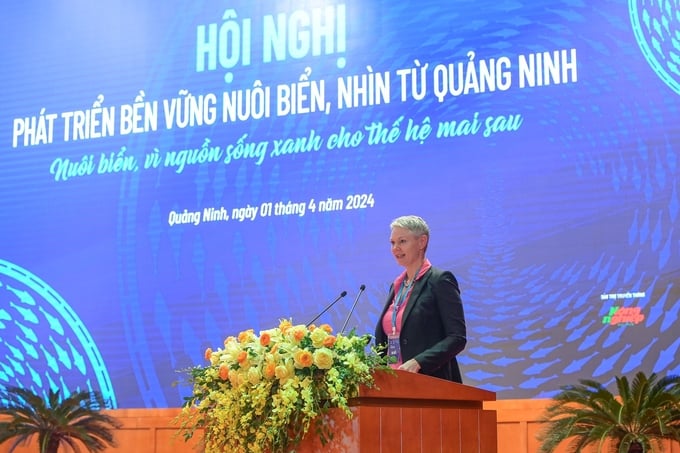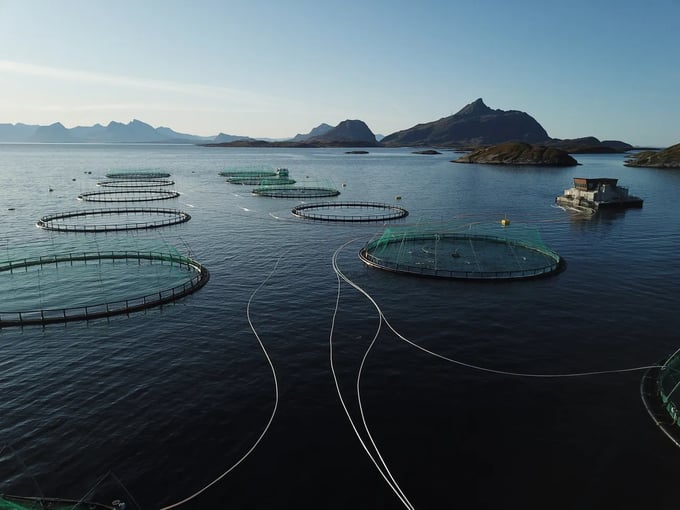May 28, 2025 | 23:26 GMT +7
May 28, 2025 | 23:26 GMT +7
Hotline: 0913.378.918
May 28, 2025 | 23:26 GMT +7
Hotline: 0913.378.918

Royal Norwegian Ambassador to Vietnam Hilde Solbakken shared insights during the Sustainable Mariculture Development Conference - Insights from Quang Ninh on April 1. Photo: Tung Dinh.
During the Sustainable Mariculture Development Conference - Insights from Quang Ninh on April 1, Royal Norwegian Ambassador to Vietnam, Hilde Solbakken, shared Norway's mariculture experience. The Ambassador noted that this was her second visit to Quang Ninh province within the last two weeks. Consequently, her increased engagement in dialogues on mariculture in the region signals promising prospects for future cooperation.
Both Vietnam and Norway are strong seafood exporters, with Norway being the second largest and Vietnam the third largest supplier of seafood products worldwide. The Norwegian Ambassador emphasized, "It is important to note that both countries are actively engaging in dialogue rather than competing in the market, which provides us with valuable opportunities to exchange experiences and lessons. Collaborative mariculture and aquaculture not only bring economic benefits to both countries, but also enhance the relationship between Vietnam and Norway."
The development direction of Vietnam's fisheries sector shares many similarities with that of Norway. Namely, sustainable marine resource exploitation is a top priority for Norway, with an emphasis on responsible harvesting. Norway's mariculture industry strives to ensure livelihoods for coastal communities and marine environmental safety.
The Ambassador commended the proactive efforts of the Vietnamese government, and its adoption of the Sustainable Mariculture Development Strategy until 2030, with a vision towards 2045. Ambassador Solbakken also praised Vietnam's long-term strategy to reduce exploitation pressure and enhance mariculture management as a necessary step towards green transformation.
As a country with abundant and diverse marine resources, Norway considers industries deriving wealth from the ocean as its strength. Accordingly, mariculture has been intricately associated with the economic, historical, and social fabric of coastal communities in Norway for many generations. To date, 70% of Norway's export revenue comes from marine activities.

Salmon farms in the area of Kvaroy Island, Norway.
According to the Ambassador, Norway exported 1.3 million tons of seafood and achieved an unprecedented level of export turnover in 2023, with 39 million meals served daily. This success stems from Norway's flexible policies and its mobilization of all available resources into science, technology, and infrastructure investments. Additionally, Ambassador Solbakken highlighted several milestones within Norwegian aquaculture.
Firstly, sustainable national spatial planning is crucial to ensure future benefits and environmental safety. Despite its relatively small mainland area of only 385,207 square kilometers, Norway boasts a vast maritime territory of 1.4 million square kilometers. Ambassador Solbakken emphasized the importance of logical marine spatial planning throughout the entire value chain, from safe farming to processing and transportation infrastructure, to reinforce sustainable ocean resource exploitation.
Secondly, enhancing scientific, technical expertise and fostering innovation in production chains will address the challenges posed by large-scale mariculture. "As we all know, uncontrolled waste discharge from mariculture can rapidly degrade the environment. I would like to consider Norway as a pioneer in the industrial mariculture revolution, based on the fishing traditions of local fishermen and modern scientific knowledge," added Ambassador Solbakken.
Furthermore, she underscored the indispensable role of continuous dialogue among policy planners, businesses, and industry experts. According to Ambassador Solbakken, Norway's mariculture industry owes its current level of success to open and transparent dialogues among stakeholders across the value chain. Public-private partnerships and international cooperation are essential for utilizing advanced technologies in aquaculture.
Ambassador Solbakken expressed hope that various aspects of sustainable mariculture in Norway also inspired Vietnamese stakeholders at the conference. Long-term exchanges between Vietnam and Norway with regards to the mariculture industry through sponsored projects, workshops, seminars, and conferences will unlock the oceanic potentials of both countries.
In 2021, the Norwegian Ministry of Trade, Industry, and Fisheries and the Vietnamese Ministry of Agriculture and Rural Development signed a Memorandum of Understanding on cooperation in mariculture. Under this agreement, Norway pledged to provide Vietnam with human resources and finances; assist Vietnam in enforcing laws on fisheries; facilitate information exchange on seafood export regulations. Notably, Norwegian seafood experts were delegated to assist testing centers in Vietnam.
Translated by Nguyen Hai Long
/2025/05/25/4127-3-073637_820.jpg)
(VAN) Thanks to the promotion from an FAO-implemented project, vegetable production in greenhouses in Moc Chau has seen strong development, from 1.5 hectares in 2021 to nearly 50 hectares in 2024.

(VAN) FAO has recently supported USD 140,000 to implement the project 'Risk mitigation human-animal interface risks through disease control initiatives in pig farming.'

(VAN) The People's Committee of Tra Vinh province has approved an adjustment to the investment policy for the Green Hydrogen Plant project, increasing its area to approximately 52.76 hectares.
![Reducing emissions from rice fields: [2] Farmers’ commitment to the soil](https://t.ex-cdn.com/nongnghiepmoitruong.vn/608w/files/news/2025/05/05/dsc08881jpg-nongnghiep-140632.jpg)
(VAN) Clean rice cultivation model in Thuong Tan commune, Bac Tan Uyen district, is assisting local residents in achieving sustainable agriculture by substantially reducing costs, increasing productivity, and protecting the environment.

(VAN) At the conference to disseminate Resolution No. 68, AgriS introduced its digital agricultural ecosystem and reaffirmed its commitment to accompanying the Government in promoting private sector development and sustainable agriculture.

(VAN) 'Blue Ocean - Blue Foods' initiative is designed to restore marine ecosystems and establish sustainable livelihoods for local communities by cultivating a minimum of 1,000 hectares of cottonii seaweed in the first three years.
/2025/05/21/4642-3-112707_603.jpg)
(VAN) The V-SCOPE project has made direct contributions to three out of six pillars of the Comprehensive Strategic Partnership between Vietnam and Australia.